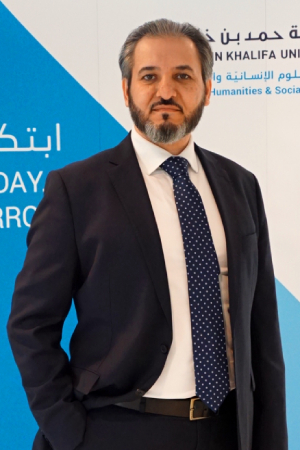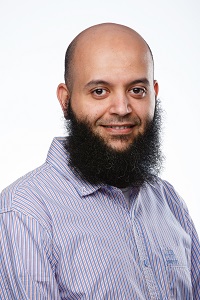- 12th International Translation Conference
- Previous TII Annual Conferences
- TII Conferences' Contacts

10th Annual International Translation Conference Workshops
10th Annual International Translation Conference Workshops
In order to attend any workshop, you need to book your seat by visiting the Conference Registration Desk at QNCC on the day of the workshop.
The seats are given on a first come first serve basis. The maximum capacity of each workshop is 20 attendees.
Workshop Overview
Although Simultaneous Interpreting has prevailed in recent years, Consecutive Interpreting service continues to play an important role. In terms of business interaction, it is ideal for last minute meetings, court hearings/depositions, interviews, and medical consultations, and does not require any professional equipment. Many even consider it to be much more reliable than other forms of interpreting, as your interpreter is sitting with you. This allows them to notice any nuances in body language, and relay that within the translation. As such, Consecutive Interpreting offers the advantage of being more conversational, with each party given an equal opportunity to listen and understand, and speak and respond. In terms of the education and training of interpreters, Consecutive Interpreting remains an integral component of most undergraduate and postgraduate interpreting programs.
Typically, when the speaker finishes their speech/remarks, or has a break in their speech, the interpreter reproduces the statement in the target language as a whole and in such a manner as if they delivered it. To store the contents of the speech/remarks, consecutive interpreters use a special system of notes, consisting of symbols representing words – keys and characters such as: consistency, negation, emphasis, entailment, etc. In this system, the interpreter is not to memorize words, but to recreate the meaning of the information from the speaker. To deliver a complete message adequately, the interpreter needs to master this system.
This workshop exposes participants to the practice of writing down pieces of information in a systematic way. And since note-taking involves certain cognitive behavior, participants will be incentivized to engage their brains in specific ways for them to grasp and retain information. They will learn how to strike a balance between recording their notes, on the one hand, and processing the information and making connections between ideas on the other.
Participants
This workshop is recommended for translation students and translators/interpreters, whether beginners or professionals. Bilingual social services workers in charge of language services can also benefit from this workshop. The maximum capacity is 20 participants.
Workshop Structure
The workshop consists of the following:
- Introductory presentation;
- Baby steps to note-taking;
- Live exercise (by trainer);
- Step-by-step guide to note-taking;
- Live exercise(s) (by trainer);
- Active listening exercises (audio and/or video texts);
- Short group practice exercises
- Group notes vs trainer notes
- Conclusion and recommendations
Methodology
- Stage 1: After being introduced to the skill of note-taking and the steps involved, participants will listen to multiple simple straightforward audio/video texts to evaluate their short-term memory skills, then analyze the information and transfer it into the target language.
- Stage 2: The trainer will conduct one live note-taking exercise. The exercise will be tantamount to step-by-step guide to the skill of note-taking.
- Stage 3: This is the cognition stage where participants start exercising: Listening Phase {listening – memory (working memory) – note-taking}; Reformulation Phase {note-reading – memory (long-term memory) – Target language production}.
- Stage 4: Group notes vs trainer notes + conclusions and recommendations.
Workshop Leader
 Mazen Alfarhan is a senior interpreter and certified legal translator with two MA degrees in interpreting/translation and diplomacy from Heriot-Watt University and London University respectively. He also holds a diploma in Arabization from Damascus University. He has been working for the last six years as a translation reviser and trainer at the Translation and Interpreting Institute of Hamad Bin Khalifa University.
Mazen Alfarhan is a senior interpreter and certified legal translator with two MA degrees in interpreting/translation and diplomacy from Heriot-Watt University and London University respectively. He also holds a diploma in Arabization from Damascus University. He has been working for the last six years as a translation reviser and trainer at the Translation and Interpreting Institute of Hamad Bin Khalifa University.
A Chevening Scholar (2004-5) and a Said Scholar (2000-1), Mazen won the CHSS ‘Best Translation Poster’ prize in 2017 for his translation of Other Words Other Meanings: A Guide to Health Care Interpreting in International Settings, published by Geneva University Hospitals in 2016. He also received three Qatar Foundation ‘Professional Excellence’ awards.
As an educator, he taught Conference Interpreting at the MA Interpreting Program of Damascus University for four years. As a professional interpreter, he interpreted at more than 150 events and for many leaders and officials around the world, including the late Kofi Annan, Former UN Secretary General, Javier Solana, Former EU Representative for Foreign and Security Policy, Pervez Musharraf, Former President of Pakistan, Atal Bihari Vajpayee, Former Prime Minister of India, Romano Brodi, Former Prime Minister of Italy, and the late Sergio Vieira de Mello, Former UN Envoy to Iraq, to name a few.
Workshop Overview
This workshop aims at familiarizing participants with the basic and most relevant notions in professional translation and providing them with translation skills necessary for performing in a variety of text types and domains; e.g. media, legal, business, technical and institutional translation. The training scheme is meant to be flexible and can accommodate various performance skill levels of participants.
Through in-sessional activities, participants will have the opportunity to get first-hand experience in translation by exposing them to the real routine work in a professional setting.
Participants
This workshop is recommended for translation students and translators, whether beginners or professionals. Communication professionals who wish to specialize in translation can also benefit from this workshop. The maximum capacity is 20 participants.
Workshop Structure
The workshop includes a combination of:
- Presentation
- Individual and group work
- Source texts excerpted from real-life translation projects
- Practice on translation strategies that ensure functional adequacy in producing target texts
Methodology
This workshop is practice-oriented with a view of applying the theoretical knowledge in Translation Studies to solving challenges and common problems translators face in their day-to-day work. A set of texts reflecting various genres and fields such as education, business and finance, media, law, science and technology, as well as texts produced by NGO’s and IGO’s will be presented to the participants to translate in class. Previously translated texts will also be used as parallel corpora to enable participants to discuss and analyze the translation choices made and come to extrapolate the techniques and strategies conducive to adequate translation.
The participants will be engaged in translation discussions to develop the skills required for performing well in a professional environment.
Workshop Leader

Sayed Mohamed has been working for TII’s Translation and Training Center as a Senior Translation Specialist since August 2014. He is contributing to the delivery of high-quality translation services to TII’s clients and strategic partners, and working towards training Translation Studies MA students during their internship with the Center. Sayed has more than 15 years of experience in various translation fields, including politics, literature, fine arts, law, medicine, education, media, and publishing. Before joining TII, Sayed was a Translation Specialist at Qatar Foundation (QF) Communication Directorate, with the mandate of delivering translation services required by QF and all its centers within the language pair Arabic-English, including large- and small-scale translation needs in support of QF’s communications strategy and related projects. Prior to that, he had worked at Nahdet Misr Publishing Group as a translator and then a publishing executive.
Sayed’s education credentials include a Bachelor’s degree in English Language and Literature from Ain Shams University, Faculty of Alsun, Egypt, in 2001. He has also received a Master’s degree in Translation Studies from Hamad Bin Khalifa University, College of Humanities and Social Sciences in 2017. He has been trained in some of the world's most respected institutions, including a six-day knowledge transfer workshop with the Economist Group, a training program for publishers from the Arab world organized by Goethe Institute in Cairo, and a project management training course based on the PMI's methodology and delivered by a certified PMP from Nahdet Misr Publishing Group.







